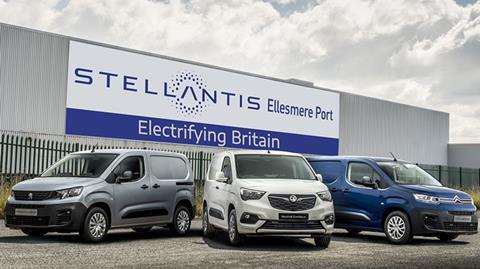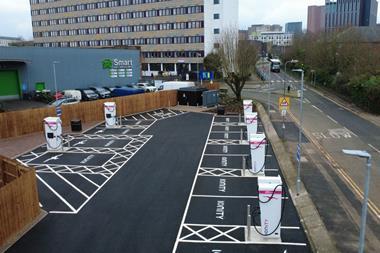
Vauxhall’s Ellesmere Port manufacturing plant is to be transformed with a £100m investment to produce electric vehicles.
The car manufacturer’s parent company, Stellantis, has announced that Ellesmere Port will become its first plant to produce a solely battery-electric model.
By the end of next year it will be producing both commercial and passenger versions for Vauxhall, Opel, Peugeot and Citroën brands, for both domestic and export markets.
Carlos Tavares, chief executive officer at Stellantis, said: “Performance is always the trigger for sustainability and this £100m investment demonstrates our commitment to the UK and to Ellesmere Port.
“I particularly want to thank our highly skilled, dedicated workforce for their patience and contribution; we never let them down. Equally, I want to thank our partners the Unite Union for their open mindset and strong cooperation and, of course, the UK Government for their continued support. Producing battery electric vehicles here will support clean, safe and affordable mobility for the citizens. Since 1903 Vauxhall has manufactured vehicles in Britain and we will continue to do so.”
Business, energy and industrial strategy secretary Kwasi Kwarteng said: “Ellesmere Port’s proud tradition in auto manufacturing will continue for many years to come thanks to today’s investment. Stellantis’ decision to double down on their commitment to this site is a clear vote of confidence in the UK as one of the best locations globally for competitive, high-quality automotive production.
“Today’s decision will not only power Ellesmere Port into a clean future, but will secure thousands of jobs across the region in the supply chain. In this global race to secure electric vehicle production, we are proud to support Britain’s auto sector in this crucial transition as we work to build back better.”
The plant at Ellesmere Port will celebrate its 60th anniversary next year, having been built in 1962, and produced its first car, the Vauxhall Viva, in 1964. Since that time it has produced subsequent generations of the Vauxhall Viva, the Vauxhall Chevette, and Vauxhall and Opel Astra. In total, it has built over 5.2 million vehicles.
This new era of manufacturing will see a transformation of the Ellesmere Port plant with a new body shop, upgraded general assembly, a compression of the site area and the creation of an on-site battery pack assembly. In addition, there will be further support to enable a pathway to carbon neutrality for the plant by the middle of this decade. The plant aims to be 100% self-sufficient for electricity and work will commence imminently on potential wind and solar farms.
Stellantis has also announced the intention to consult on further investment into the Ellesmere Port site with the creation of a new UK parts distribution centre.
From later next year, Ellesmere Port will build four all-electric light commercial vehicles LCVs) – Vauxhall Combo-e, Opel Combo-e, Peugeot e-Partner and Citroën e-Berlingo – and four passenger car models - Vauxhall Combo-e Life, Opel Combo-e Life, Peugeot e-Rifter and the Citroën e-Berlingo.
The LCV and their passenger car variants are all powered by a 100kW (136hp) motor with a 50kWh lithium-ion battery. They are able to be charged at up to 100kW and take 30 minutes to charge from 0% to 80%. Under WLTP conditions, they are capable of up to 174 miles of range.
Vauxhall, Opel, Peugeot and Citroën brands have already committed to each offering all-electric versions of their entire respective van model ranges before the end of 2021. Fiat Professional is also committed to offering electrified and alternatively fuelled versions across its van range.

































No comments yet